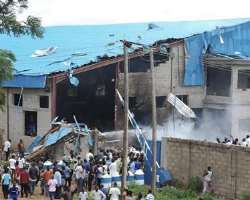Gunfire In Nigeria's Kaduna As Muslims Demonstrate

Nigerian Muslims took to the streets in the northern city of Kaduna on Tuesday, firing AK-47s, burning tyres and destroying at least one church, two days after rioting by Christian youths killed 52 people, witnesses said.
Multiple gunshots were heard across the city where at least 52 people were killed on Sunday in retaliatory violence after suspected Islamist suicide bombings of three churches in Kaduna state that killed 19 Christians.
Religiously mixed Kaduna is near the volatile "Middle Belt", where the mostly Christian south and largely Muslim north meet and the city has sometimes been a sectarian flashpoint.
"They are out on the streets, burning tyres and shooting. They burned a church," said a witness, who only gave his first name, Suleiman, for fear of reprisals.
It was not immediately clear if the shots were fired into the air or at people or other targets. There was no word on casualties.
Hundreds of kilometres away in the northeast city of Damaturu, residents reported gunfire and explosions through the night. The Yobe state government imposed a 24-hour curfew as the military fought with gunmen.
The protests in Kaduna followed attacks on Sunday by angry Christian youths who set up roadblocks, dragged Muslims from their vehicles and killed them, according to witnesses.
Kaduna's government re-imposed a 24-hour curfew across the state, less than a day after relaxing restrictions.
Riots killed hundreds in the city in April last year after President Goodluck Jonathan, a southern Christian, defeated northern Muslim Muhammadu Buhari in elections.
The violence has stoked fears of a wider sectarian conflict in Nigeria, an OPEC member and Africa's top oil producer that is home to the world's largest equal mix of Christians and Muslims.
Islamist sect Boko Haram, which is waging an insurgency against President Jonathan's government, has claimed deadly attacks on churches in the past, including on the previous two Sundays.
The church bombings seem calculated to trigger wider sectarian strife. Boko Haram's leader, Abubakar Shekau, has said, in al Qaeda-style Internet videos, that the attacks on Christians were revenge for the killing of Muslims.
Such attacks have in the past usually failed to spark sustained conflict in a nation whose Muslims and Christians mostly co-exist peacefully, despite periodic flare-ups of sectarian violence since independence from Britain in 1960.
The majority of Boko Haram's violence takes place in its home base in the remote northeast but its attacks have spread across the north and to the capital Abuja in the last year.
REUTERS
